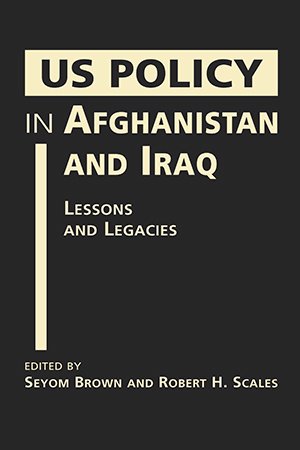Seyom Brown and Robert H. Scales, editors
How have the costs, both human and material, of US involvement in the conflicts in Afghanistan and Iraq affected the country's will for conducting regime-change operations? What are the implications for issues of strategy? The authors of US Policy in Afghanistan and Iraq assess the impact of the two conflicts on US foreign policy, military planning, and capacities for counterinsurgency and state building. They also offer keenly insightful guidance for avoiding the pitfalls and increasing the prospects for success when the United States does intervene.
Seyom Brown is John Goodwin Tower Distinguished Chair in International Politics and National Security in the Department of Political Science at Southern Methodist University. The most recent of his many publications include
Higher Realism: A New Foreign Policy for the United States and
The Illusion of Control: Force and Foreign Policy in the 21st Century.
Robert H. Scales (Maj. Gen., retired) is former commandant of the US Army War College. Dr. Scales is author of
Firepower in Limited War, a history of the evolution of firepower doctrine since the end of the Korean War and
Yellow Smoke: The Future of Land Warfare for America's Military, as well as
The Iraq War: A Military History (with Williamson Murray).
Also of interest:
Assessing the War on Terror by Mohammed Ayoob and Etga Ugar, editors
No rights in South Asia"A superb collection of essays that offers a sober, critical assessment of US military strategy and doctrinal precepts in Iraq and Afghanistan. This book is essential reading for any serious student of military affairs and international security"—Fen Osler Hampson, Carleton University






